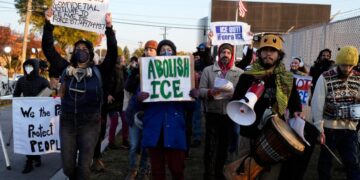By Nancy Thorner –
As drug makers race to develop a vaccine against the coronavirus, several legal questions are emerging. Could the U.S. government require people to get it? Could people who refuse to roll up their sleeves get banned from stores or lose their jobs?
According to Dov Fox, a law professor and the director of the Center for Health Law Policy and Bioethics at the University of San Diego, the short answer is "yes."
Fox noted authorities in the United States have never attempted to jail people for refusing to vaccinate, but other countries like France have adopted the aggressive tactic.
The legal precedent dates back to 1905. In a landmark U.S. Supreme Court case, Jacobson v. Massachusetts, the court ruled Massachusetts had the authority to fine people who refused vaccinations for smallpox.
That case formed the legal basis for vaccine requirements at school and has been upheld in subsequent decisions. Said Fox, “Courts have found that when medical necessity requires it, the public health outweighs the individual rights and liberties at stake.”
Although states would have the authority to mandate vaccinations, there’s more doubt about whether Congress could enact a federal requirement.
The most likely federal vaccination requirement would come in the form of a tax penalty, but, according to Fox: “Given the current composition of the Supreme Court, a federal vaccine requirement would likely be found unconstitutional.”
U.S. Federal government as propaganda machine
It is interesting that the US Federal government is functioning as a government propaganda machine in collaboration with Yale University. Clinical trials were held to determine what the best messaging would be to persuade Americans to take the COVID-19 vaccine when it is ready.
The study essentially looks at the best possible messaging that can be used on Americans, ranging from expressing vaccine benefits, to using messaging about economic impact, making someone feel guilty or embarrassed for not taking the vaccine, and so on.
The official title of the trial, “Persuasive Messages for COVID-19 Vaccine Uptake: a Randomized Controlled Trial, Part 1”, essentially looks at the best possible messaging that can be used on Americans, ranging from expressing vaccine benefits, to using messaging about economic impact, making someone feel guilty or embarrassed for not taking the vaccine, and so on.
Why the rejection of HC as a treatment
Despite this support,
corroborated by scientific studies, the medical establishment, under the auspices of Dr. Anthony Fauci, has refused to grant hydroxychloroquine “Emergency Use Authorization” (EUA).
“The document makes clear that Emergency Use Authorization cannot be used for more than one drug or therapeutic, and the establishment is potentially therefore saving the EUA pre-emptively for vaccines and remdesivir – patently high-value Big Pharma drugs – instead of hydroxychloroquine.”
Dr. Vladimir Zelenko, who
authored a study on the efficacy of hydroxychloroquine, outlined the medical establishment’s campaign against the drug on the
War Room: Pandemic show.
Emphasized by Dr. Zelenko was that Dr. Fauci has “lied to the American people” by insisting that authorizing a treatment for COVID-19 rests on “controlled trials to get anything through the FDA.” According to Dr. Zelenko, “That is not true. That has never been the historical precedent and almost no other medication has ever had to meet those standards.”
As Dr. Zelenko describes, “there’s 150,000 dead corpses, most of which could have been avoided if Dr. Fauci did the moral and correct thing.
Jim Hoft of the Gateway Pundit had the following to say in his August 6, 2020 article,
Jail Fauci: Massive international study shows countries early HCQ use lowered mortality rate by 79%:
“Dr. Fauci, Dr. Birx, the CDC, the liberal fake news media and the tech giants have been pushing a lie that has had deadly consequences! As to having this nation reportedly lose over 150,000 lives, that could have been lowered by nearly 80% if HCQ use would have been promoted in the US!"
Vaccine as beginning of end?
So much hope is being placed on a vaccine breakthrough, but might a vaccine represent only the beginning of the end?
In a rather long article dated July 24, 2020,
A Vaccine Reality Check , written by Sarah Zhang of
The Atlantic, following are two of her observations:
“Nearly five months into the pandemic, all hopes of extinguishing COVID-19 are riding on a still-hypothetical vaccine. And so a refrain has caught on: We might have to stay home—until we have a vaccine. Close schools—until we have a vaccine. Wear masks—but only until we have a vaccine. During these months of misery, this mantra has offered a small glimmer of hope. Normal life is on the other side, and we just have to wait—until we have a vaccine.
Furthermore:
"Biologically, a vaccine against the COVID-19 virus is unlikely to offer complete protection. Logistically, manufacturers will have to make hundreds of millions of doses while relying, perhaps, on technology never before used in vaccines and competing for basic supplies such as glass vials. Then the federal government will have to allocate doses, perhaps through a patchwork of state and local health departments with no existing infrastructure for vaccinating adults at scale. To complicate it all,
20 percent of Americans already say they will refuse to get a COVID-19 vaccine, and with another 31 percent unsure, reaching herd immunity could be that much more difficult."
FDA defines vaccine requirements
As
Dr. Kathleen Neuzil, Director of the Center for Vaccine Development at the University of Maryland said:
“We should anticipate the SARS-CoV-2 vaccine to be similar to the influenza vaccine. That vaccine may or may not keep people from being infected with the virus, but it does keep people out of the hospital and the ICU.”
Barry Bloom, immunologist and professor of public health at the Harvard T.H. Chan School of Public Health in Boston, told
USA Today that almost all of the vaccine developers were considering two shots in their regimens. The first shot in the series would “prime the immune system” to help the body recognize the virus, followed by a second shot to “strengthen the immune response.
Vaccines under development
Moderna, an American company, is now conducting its Phase 3 trial in the U.S.
Moderna has a
two-dose vaccination schedule via an injection in the upper arm, administered 28 days apart.
Recent results show the vaccine-induced rapid and strong immune responses against SARS-CoV-2.
In England biotech company
AstraZeneca, using a vaccine developed by the University of Oxford, is also in its Phase 3 trial and is running trials in Britain, Brazil, and South America.
Study results have shown that a single dose of the vaccine led to a four-fold increase in antibodies to the SARS-CoV-2 spike protein in 95% of participants one month following vaccination.
Phase 3 trials are the largest and longest of the three phases. They normally take years, but they’re being compressed into months because of the pandemic. For Phase 3 vaccine makers need to enroll tens of thousands of people to confirm efficacy and to look for rare and long-term side effects. Time is needed to recruit participants, time to wait for them to be naturally exposed to COVID-19, time for any long-term side effects to show up, and time to simply analyze all the data.
In a report updated on August 7 by William M. Detmer, MD, supported by the Unbound Medicine Team, multiple vaccines are under development. Approximately 26 are in clinical trials and 139 in pre-clinical evaluation.
Check here to see how vaccines in development are being rated.
In the U.S., the Trump administration’s
Operation Warp Speed is helping vaccine makers invest in manufacturing facilities while these trials are ongoing. This could reduce the lag time between the approval and the availability of a vaccine, since companies might otherwise wait for FDA approval before scaling up manufacturing. But making hundreds of millions of doses is still a considerable challenge, especially for a novel vaccine.
For all the uncertainties that remain ahead for a COVID-19 vaccine, as to the question whether the virus is going to go away,
Dr. Ruth Karron, the vaccine expert at Johns Hopkins, had this to say: "The answer is NO. The virus is already too widespread. A vaccine could still mitigate severe cases; it could make COVID-19 easier to live with. The virus is likely here to stay, but eventually, the pandemic will end."
Related







